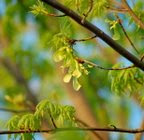This is directly off of the History Channel's Engineering an Empire page:
Growing Water
In 2106, water will be the world's most valuable resource: the new oil. UrbanLab's project envisions Chicago evolving into a model city for "growing water" by creating a series of Eco-Boulevards spread throughout the city. The Eco-boulevards will function as a giant "Living Machine" which will treat 100% of Chicago's wastewater and stormwater naturally, using micro-organisms, small invertebrates (such as snails), fish and plants. Treated water will be harvested and/or returned to the Great Lakes Basin. Ultimately, the Eco-Boulevards will create a closed water loop within Chicago.
The Growing Water project is inspired by three historic Chicago engineering feats:Expert's Corner
- The "Emerald Necklace" of public parks, boulevards and waterways, which will be greatly supplemented by the new Eco-Boulevards,
- The reversal of the Chicago River, which UrbanLab proposes to un-do in order to retain (not drain) Lake Michigan; and,
- The Deep Tunnel, which UrbanLab proposes to re-program to house mass-transportation trains.
Commentary from Daniel Libeskind
Chicago
"The city of Chicago winner - Urban Lab - takes its inspiration from the wonders of water. By focusing on ecosystems as living dimensions of the city, the proposal creates a green infrastructure. The authors aim at creating a self-sufficient living system, by proposing a 100% saving, recycling and "growing" of water resources. This visionary project envisions the creation of boulevards, water ways and a renewed sense of the interconnectedness of resources in the City. The idea is a powerful one, and the projected vistas remind us of the utopian dreams of 19th and 20th century architectural visions. The kind of life that is implied is one where skyscrapers are standing in green fields; where the word "urban" looses all its historical and social connotations. Are we on the threshold of a viable reality? Or, does this project reveal all the contradictions of modern society and the notion that nature has lost all its "naturalness."


